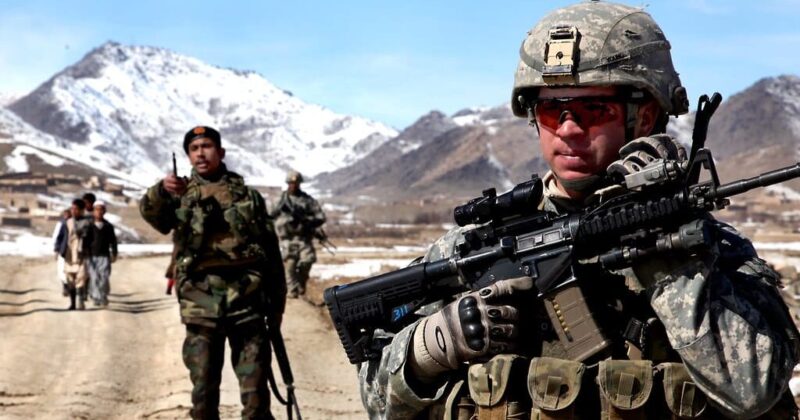

By Dave Stockton
AS THE 20th anniversary of George W Bush’s declaration of the War on Terror and the misnamed Operation Enduring Freedom approached, Joe Biden pulled the plug on the Nato occupation of Afghanistan.
Announcing the exit of the remaining 2,500 US troops from the country led to horrible scenes in Kabul airport, with people desperately clinging to the undercarriage of departing aircraft.
Biden, with breathtaking cynicism, delivered the final judgment on America’s longest war: ‘We don’t do nation building’, and blamed the Afghan army for not being willing to defend their own country. After Trump set a deadline for withdrawal and agreed conditions favourable to the Taliban, the disintegration of the Afghan army and the entire regime was inevitable.
Democracy—especially the corrupt and fraudulent version exported by Western imperialism—cannot be implanted by bombing farmers and bribing local politicians and warlords. The withdrawal of the occupying forces and the inevitable collapse of their puppet government are preconditions for progressive forces to assume the leadership in Afghans’ fight for self-determination.
But today the leading figures of the corrupt and fraudulently ‘elected’ Karzai and Ghani governments have fled the country. The Taliban’s Islamic Emirate, having struck deals with local chiefs and warlords, now controls more of the country than it did between 1996 and 2001.
Women are likely to be the biggest victims. The large numbers who have been through school and university—one of the few progressive results of the occupation—will now be left to the mercies of what a Taliban spokesperson called ‘Islamic jurisprudence’. The country’s national and religious minorities face the prospect of a renewed sectarian bloodbath.
For Afghans, the end of the West’s war is only the opening of a new stage in their civil war. Socialists, feminists and internationalists need to follow what happens and protest any measures taken against women, girls and minorities. Some of the most courageous statements since the takeover have come from female activists. They need our support, but we should oppose any attempt to sanction the Taliban government which would only obstruct aid efforts and give the Taliban a pretext for repression.
Failure
We should also remember that human rights, including the rights of women, were rarely stated as the aim of the invasion of Afghanistan. This was a war that was declared solely to advance the imperialist interests of the US and its allies, sold to the public as a war necessary to protect them from international terrorism.
The withdrawal is a major defeat for US imperialism and its British and European Union allies. Despite the overthrow of the Taliban, the toppling of Saddam Hussein, the killing of Osama Bin Laden and the destruction of the Isis ‘caliphate’, the entire War on Terror has been a strategic failure.
It has devastated the cities and infrastructure of the Middle East and driven millions to squalid refugee camps. The EU states and the UK have refused to take responsibility for the crisis they created, instead strengthening their borders and deporting those who make it to safety.
Far from reducing the threat of ‘international terrorism’, jihadi groups like Boko Haram have spread across the states of sub-Saharan Africa. Local franchises of al-Qaeda, Isis and other groups continue to wage guerrilla warfare and launch terrorist attacks on a regular basis, in turn inspiring ‘lone wolf’ attacks in Europe.
The suffering inflicted on Afghanistan far outweighs the gains for Afghan women and youth. Because they rested on a foreign occupation and a corrupt and undemocratic puppet regime, these gains were doomed to collapse into the sand. The Economist quotes one of the young students protesting the arrival of the Taliban: “We have to support our own country. For 20 years the Americans have been here, but we haven’t seen good results. It has to be us.”